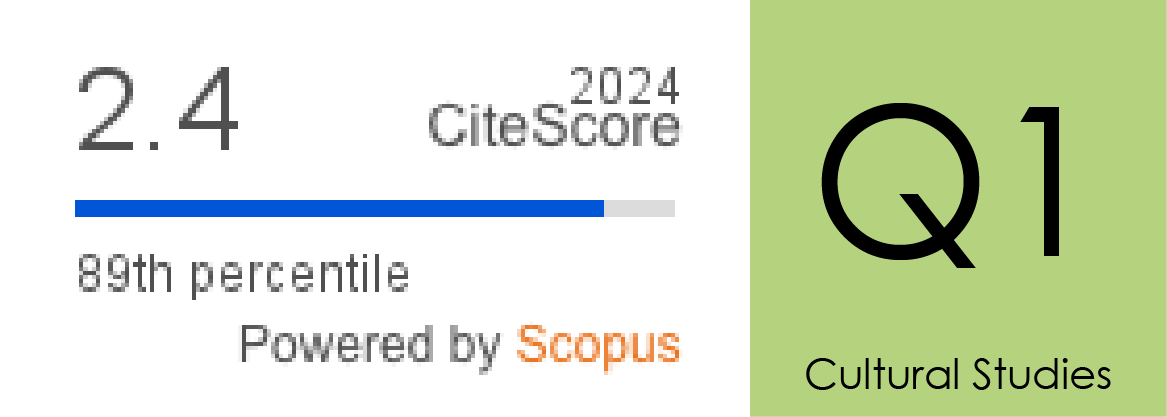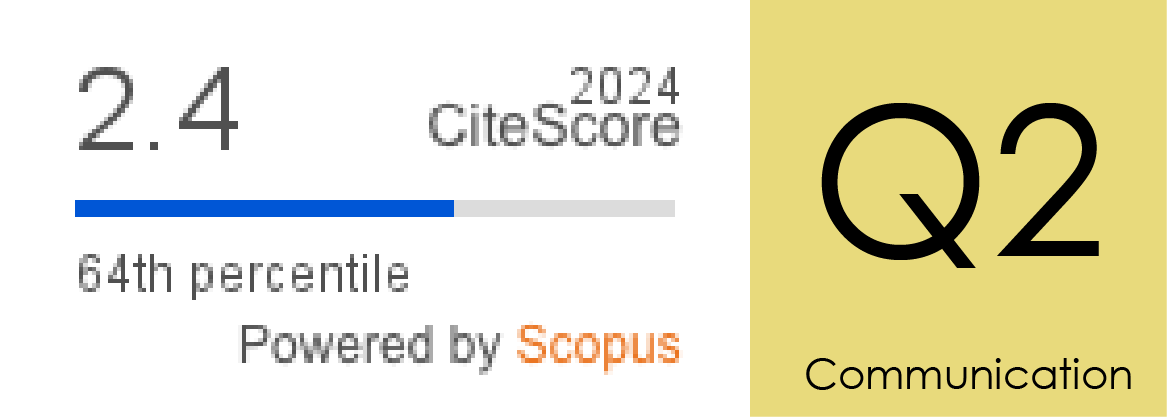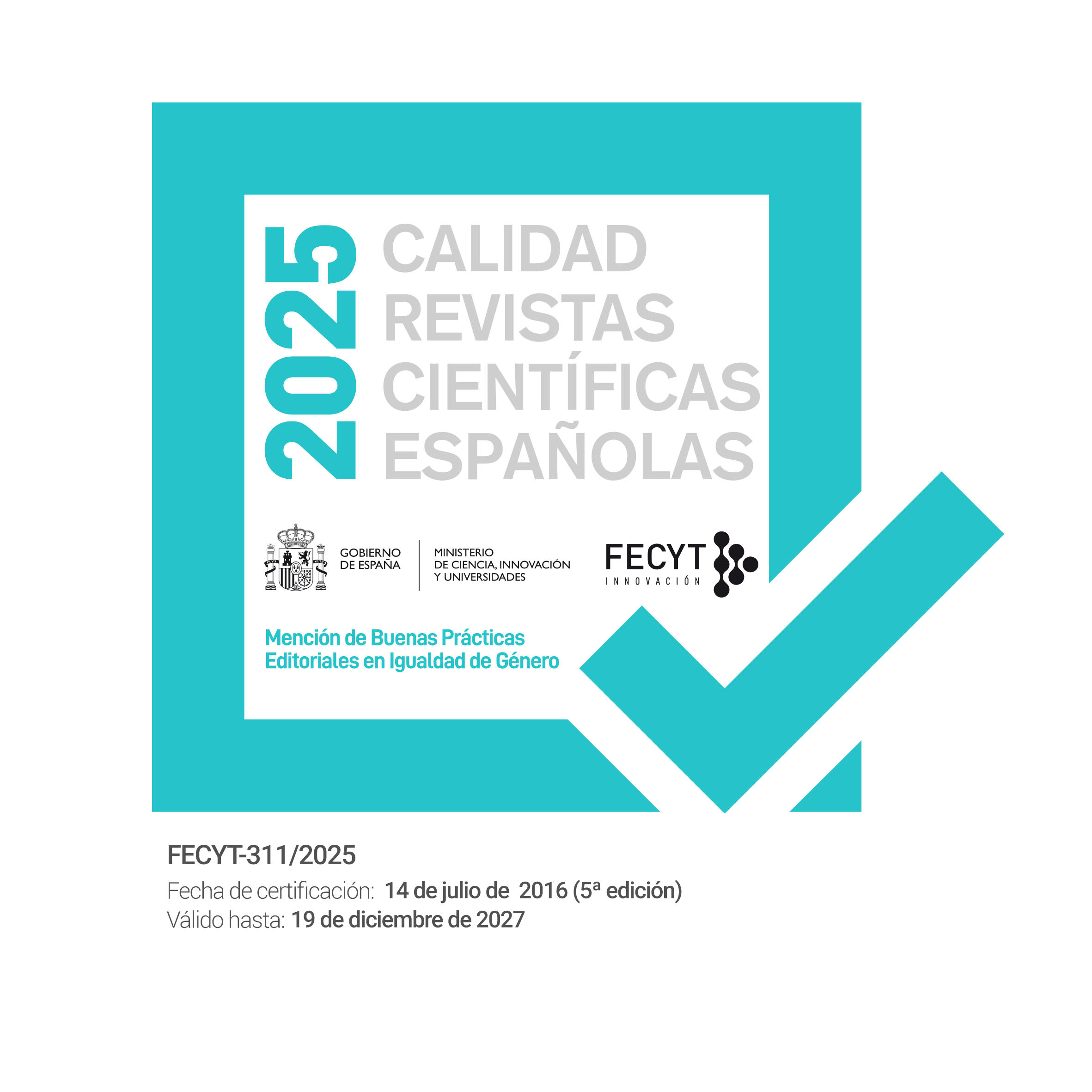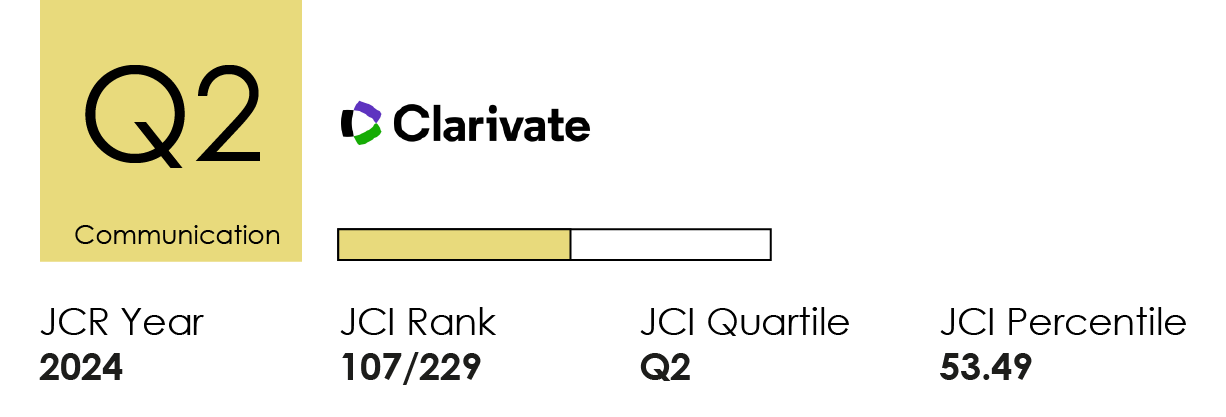Lobby de las asociaciones empresariales de movilidad y transporte en España: las principales variables para influir en las decisiones públicas
DOI:
https://doi.org/10.14198/MEDCOM.27655Palabras clave:
Asuntos Públicos, Lobby, Movilidad, Ranking, Transparencia, TransporteResumen
El lobby es una de las actividades de relaciones públicas más controvertidas. Tradicionalmente, los grupos de interés del sector de la movilidad y el transporte han participado en la elaboración de políticas por su papel en cuestiones medioambientales. Esta investigación pretende averiguar la influencia de este sector a lo largo del primer semestre de 2022, en comparación con otras industrias de España. También profundiza en la capacidad comparativa de influencia entre subsectores: fabricantes y concesionarios; componentes y agentes de reparación; transporte de personas, y transporte de mercancías. Cada organización recibe una puntuación en función de su número de puestos en comités, número de integrantes, cifra de personal, antigüedad, transparencia y relevancia económica. En conjunto, las asociaciones de movilidad y transporte se sitúan por detrás de las industrias de transición digital y agroalimentaria en el ranking de influencia. Las puntuaciones de las organizaciones mejor posicionadas se basan principalmente en su número de puestos en comités públicos y de miembros; las compañías fabricantes y concesionarios de vehículos de motor encabezan la clasificación de movilidad.
Citas
Almansa-Martínez, A., Moreno-Cabanillas, A., y Castillo-Esparcia, A. (2021). Political Communication in Europe. The role of the lobby and its communication strategies. In Á. Rocha, D. Barredo, P. C. López-López, & I. Puentes-Rivera (Eds.), Communication and smart technologies: Proceedings of ICOMTA 2021 (pp. 238-248). Springer Singapore. https://doi.org/10.1007/978-981-16-5792-4_24
Asociación Nacional de Fabricantes de Automóviles y Camiones. (2022). Informe anual 2021. https://bit.ly/3YcdX2k
Anteproyecto de Ley de Transparencia e Integridad en las Actividades de los Grupos de Interés. Ministerio de Hacienda y Función Pública, documento sometido a trámite de información pública, de 14 de noviembre de 2022. https://bit.ly/3ZUOtaO
Arceo, J. L. (1988). Fundamentos para la teoría y técnica de las Relaciones Públicas. Promociones y Publicaciones Universitarias.
Arceo-Vacas, A., y Álvarez-Sánchez, S. (2023). El lobbying de las organizaciones de la sociedad civil en España: capacidad de influencia sobre las instituciones públicas. Estudios sobre el Mensaje Periodístico, 29(3), 521-532. https://doi.org/10.5209/esmp.88987
Awad, E. (2024). Understanding influence in informational lobbying. Interest Groups & Advocacy, 13(1), 1-19. https://doi.org/10.1057/s41309-023-00197-0
Baehr, C. J., Bare, F., y Heddesheimer, V. (2023). Climate exposure drives firm political behavior: evidence from earnings calls and lobbying data. SocArXiv Papers. https://doi.org/10.31235/osf.io/yq27d
Baena, P., De-la-Fuente, A., del-Alcázar, J., Riesgo, J. P., & Sicilia, J. (Coords.). (2023). El mecanismo de recuperación y resiliencia en España: balance provisional y propuestas de mejora (informe Estudios sobre la Economía Española nº 2023-03). FEDEA. https://bit.ly/3ULnni6
Bekele, W., y Ago, F. (2022). Sample size for interview in qualitative research in Social Sciences: a guide to novice researchers. Research in Educational Policy and Management, 4(1), 42-50. https://doi.org/10.46303/repam.2022.3
Beltrán-Bueno, M. Á., y Parra-Meroño, M. C. (2017). Perfiles turísticos en función de las motivaciones para viajar. Cuadernos de Turismo, (39), 41-65. https://doi.org/10.6018/turismo.39.290391
Bermúdez-Sánchez, J. (2020). Buen gobierno, transparencia y protección de datos. En J. Bermúdez-Sánchez y A. de Marcos-Fernández (Eds.), Transparencia, lobbies y protección de datos (pp. 31-80). Thomson Reuters Aranzadi.
Bitektine, A., Hill, K., Song, F., y Vandenberghe, C. (2020). Organizational legitimacy, reputation, and status: insights from micro-level measurement. Academy of Management Discoveries, 6(1), 107-136. https://doi.org/10.5465/amd.2017.0007
Bowen, G. S. (1996). Influence, information and lobbying in the European Union: a comparison of business sector strategies [Tesis doctoral, London School of Economics and Political Science]. LSE Theses Online. https://bit.ly/44FSHn7
Boyne, G. A. (2002). Public and private management: what’s the difference? Journal of Management Studies, 39(1), 97-122. https://doi.org/10.1111/1467-6486.00284
Bunea, A. (2020). Understanding the European Commission’s use of politicisation in the negotiation of interinstitutional agreements: the role of consultations and issue framing. Journal of European Public Policy, 27(3), 439-459. https://doi.org/10.1080/13501763.2020.1712461
Castillo-Esparcia, A., Moreno-Cabanillas, A., y Almansa-Martínez, A. (2023). Lobbyists in Spain: professional and academic profiles. Social Sciences, 12(4), 1-14. https://doi.org/10.3390/socsci12040250
Crespo-Val, V. (2021). Estrategias de comunicación de lobbying indirecto. El lobby de la alimentación frente a un impuesto a bebidas azucaradas en España (2016-2019) [Tesis doctoral, Universidad San Pablo CEU]. Repositorio Institucional CEU. https://acortar.link/rj8PkI
Dubal, V. B., Collier, R. B., y Carter, C. L. (2018). Disrupting regulation, regulating disruption: the politics of Uber in the United States. Perspectives on Politics, 16(4), 919-937. https://bit.ly/3WI3Ly5
Davidson, S. (2015). Everywhere and nowhere: theorising and researching public affairs and lobbying within public relations scholarship. Public Relations Review, 41(5), 615-627. https://doi.org/10.1016/j.pubrev.2014.02.023
Dinan, W. (2021). Lobbying transparency: the limits of EU monitory democracy. Politics and governance, 9(1), 237-247. https://doi.org/10.17645/pag.v9i1.3936
Drabik, D., y Venus, T. (2019). EU biofuel policies for road and rail transportation sector. In L. Dries, W. Heijman, R. Jongeneel, K. Purnhagen, & J. Wesseler (Eds.), EU Bioeconomy Economics and Policies: Volume II (pp. 257-276). Palgrave Macmillan. https://doi.org/10.1007/978-3-030-28642-2_14
Dwidar, M. A. (2022). Diverse lobbying coalitions and influence in notice‐and‐comment rulemaking. Policy Studies Journal, 50(1), 199-240. https://doi.org/10.1111/psj.12431
Dyrhauge, H. (2014). The road to environmental policy integration is paved with obstacles: Intra-and inter-organizational conflicts in EU transport decision-making. JCMS: Journal of Common Market Studies, 52(5), 985-1001. https://doi.org/10.1111/jcms.12128
Dyrhauge, H. (2021). Discourses about EU Transport decarbonisation: towards a paradigm shift? The International Spectator, 56(3), 71-86. https://doi.org/10.1080/03932729.2021.1962665
Fisker, H. M. (2015). Dead or alive? Explaining the long-term survival chances of interest groups. West European Politics, 38(3), 709-729. https://doi.org/10.1080/01402382.2014.962246
Flöthe, L. (2019). The costs of interest representation - a resource perspective on informational lobbying. European Political Science Review, 11(2): 161-178. https://doi.org/10.1017/S1755773919000055
Fredheim, N. A. (2024). Public event lobbying: how interest groups use seminars and conferences for political influence. Interest Groups & Advocacy, 13(3), 333-352. https://doi.org/10.1057/s41309-024-00216-8
Galvin, R. (2020). Yes, there is enough money to decarbonize the economies of high-income countries justly and sustainably. Energy Research & Social Science, 70, 1-8. https://doi.org/10.1016/j.erss.2020.101739
Göcke, L., Hülsebusch, K., y Menter, M. (2022). The legitimacy of corporate entrepreneurship: a structured literature review. Management Review Quarterly, 72(2), 385-416. https://doi.org/10.1007/s11301-021-00246-5
Haas, T., y Sander, H. (2020). Decarbonizing transport in the European Union: emission performance standards and the perspectives for a European Green Deal. Sustainability, 12(20), 1-15. https://doi.org/10.3390/su12208381
Hanegraaff, M., van-der-Ploeg, J., y Berkhout, J. (2020). Standing in a crowded room: exploring the relation between interest group system density and access to policymakers. Political Research Quarterly, 73(1), 51-64. https://doi.org/10.1177/1065912919865938
Hayes-Renshaw, F., y Wallace, H. (2006). The Council of Ministers (2ª ed.). Palgrave MacMillan.
Ihlen, Ø., y Raknes, K. (2020). Appeals to ‘the public interest’: how public relations and lobbying create a social license to operate. Public Relations Review, 46(5), 1-8. https://doi.org/10.1016/j.pubrev.2020.101976
Junk, W. M. (2020). Synergies in lobbying? Conceptualising and measuring lobbying coalitions to study interest group strategies, access, and influence. Interest Groups & Advocacy, 9(1), 21-37. https://doi.org/10.1057/s41309-019-00077-6
Klüver, H. (2013). Lobbying in the European Union: interest groups, lobbying coalitions, and policy change. Oxford University Press.
Koch T., y Schulz-Knappe, C. (2021). Corporate lobbying: role perceptions and perceived influence on political decisions of public affairs professionals. Public Relations Review, 47(4): 1-7. https://doi.org/10.1016/j.pubrev.2021.102062
Labarca, C., Arceneaux, P. C., y Golan, G. J. (2020). The relationship management function of public affairs officers in Chile: identifying opportunities and challenges in an emergent market. Journal of Public Affairs, 20(3), 1-12. https://doi.org/10.1002/pa.2080
Laboutková, Š., y P. Vymětal. (2019). A new approach in evaluation of transparent lobbying - the case of Visegrad group countries. Administratie si Management Public, 2019(33): 119-132. https://bit.ly/4gWjyB6
Levine, J. M. (1999). Solomon Asch’s legacy for group research. Personality and Social Psychology Review, 3(4), 358-364. https://doi.org/10.1207/s15327957pspr0304_5
Lock, I., y Jacobs, S. (2023). Behind closed doors: how Public Affairs professionals perceive the process of organizational frame-building. International Journal of Communication, 17, 178-197. https://bit.ly/4bj2SjV
Lowery, D. (2007). Why do organized interests lobby? A multi-goal, multi-context theory of lobbying. Polity, 39(1), 29-54. https://doi.org/10.1057/palgrave.polity.2300
Lowery, D., y Gray, V. (2004). A neopluralist perspective on research on organized interests. Political Research Quarterly, 57(1), 164-175. https://doi.org/10.1177/106591290405700114
Mbaka, N., y Isiramen, O. M. (2021). The changing role of an exploratory research in modern organisation. GPH-International Journal of Business Management, 4(12), 27-36. https://doi.org/10.5281/zenodo.6992256
Mikkonen, S. (2024). EU lobbying through everyday practices: an ethnographic study on relational power in transnational in-house EU lobbying in Helsinki and Brussels 2017–2020 [Tesis doctoral, Universidad de Tampere]. Trepo. https://bit.ly/3TZiQsV
Miotto, G., Del-Castillo-Feito, C., y Blanco-González, A. (2020). Reputation and legitimacy: key factors for Higher Education Institutions’ sustained competitive advantage. Journal of Business Research, 112, 342-353. https://doi.org/10.1016/j.jbusres.2019.11.076
Nieto-Jiménez, J. C. (2020). La transparencia en las Cortes Generales a la luz de las recomendaciones del Greco: el Código de Conducta de los Diputados. Revista Española de la Transparencia, 2020(10), 31-47. https://doi.org/10.51915/ret.88
Nownes, A. J. (2015). Organizational demography research in the United States. In D. Lowery, D. Halpin, & V. Gray (Eds.), The organization ecology of interest communities (pp. 17-36). Palgrave Macmillan. https://doi.org/10.1057/9781137514318_2
Olejnik, M. (2024). When is grassroots lobbying effective? The case of the e-petitions at the national level in the UK. Interest Groups & Advocacy, 13(3), 1-31. https://doi.org/10.1057/s41309-024-00208-8
O’Shaughnessy, N. (2022). Idea of Propaganda. In P. Harris, A. Bitonti, C. S. Fleisher, & A. S. Binderkrantz (Eds.), The Palgrave Encyclopedia of Interest Groups, Lobbying and Public Affairs (pp. 623-628). Springer. https://doi.org/10.1007/978-3-030-44556-0_186
Pineda-Cachero, A. (2002). Lobbies y grupos de presión: de la política a la comunicación. Una fundamentación teórica. Laurea Hispalis: Revista internacional de investigación en relaciones públicas, ceremonial y protocolo, 1, 87-122. https://bit.ly/3ZUouk0
Potters, J., y Sloof, R. (1996). Interest groups: a survey of empirical models that try to assess their influence. European Journal of Political Economy, 12(3), 403-442. https://doi.org/10.1016/S0176-2680(96)00008-0
Revaz, S. (2024). Are interest groups effective public action influencers in the field of education? Case studies of two school reforms in Switzerland. European Educational Research Journal, 1-18. https://doi.org/10.1177/14749041231221468
Rasmussen, A., y Otjes, S (2024). Responding to whom? An experimental study of the dynamics of responsiveness to interest groups and the public. Journal of European Public Policy, 1-28. https://doi.org/10.1080/13501763.2024.2306226
Ridao, J. (2018). La regulación de los lobbies en el ámbito institucional del Estado. Una revisión crítica del alcance de las recientes iniciativas legislativas. Dilemata: Revista Internacional de Éticas Aplicadas, 27(2018), 73-89. https://bit.ly/3K5doPK
Rietmann, N., y Lieven, T. (2019). How policy measures succeeded to promote electric mobility - Worldwide review and outlook. Journal of Cleaner Production, 206(2019), 66-75. https://doi.org/10.1016/j.jclepro.2018.09.121
Rubio-Núñez, R. (2018). La nueva ola de regulación de los grupos de presión parlamentarios. Foro: Revista de ciencias jurídicas y sociales, 21(2), 397-420. https://doi.org/10.5209/FORO.64032
Sadi, G., y Ramos-Meneghetti, M. (2020). A normative approach on lobbying. Public policies and representation of interests in Argentina. Journal of Public Affairs, 20(2), 1-7. https://doi.org/10.1002/pa.1907
Swedberg, R. (2020). Exploratory research. In C. Elman, J. Gerring & J. Mahoney, (Eds.), The production of knowledge: Enhancing progress in social science (pp. 17-41). Cambridge University Press.
Schwedes, O. (2011). The field of transport policy: an initial approach. Journal Policy Studies, 7(2), 7-41. https://bit.ly/3WI5bbT
Singh, K., y Grewal, R. (2023). Lobbying and product recalls: a study of the US automobile industry. Journal of Marketing Research, 60(4), 728-749. https://doi.org/10.1177/00222437221131568
Strömbäck, J., y Kiousis, S. (2019). Defining and mapping the field of theory and research on Political Public Relations. In J. Strömbäck, & S. Kiousis (Eds.), Political Public Relations: concepts, principles, and applications (2ª ed.) (pp. 14-60). Routledge. https://doi.org/10.4324/9781351053143-1
Trofymenko, A. y Lubinets, D. (2020). Lobbying in the European Union: supranational level of legal regulation and functioning. European Political and Law Discourse, 7(1), 45-52. https://bit.ly/3QOjFmJ
Truijens, D., y Hanegraaff, M. (2024). It ain’t over ‘til it’s over: Interest-group influence in policy implementation. Political Studies Review, 22(2), 387-401. https://doi.org/10.1177/14789299231162015
Vargas-Martín, J. (2023). El repentino adelanto electoral se lleva por delante la ley de familias y decenas de proposiciones legislativas. Público. https://bit.ly/3TUIn6o
Varone, F., Bundi, P., y Gava, R. (2020). Policy evaluation in parliament: interest groups as catalysts. International Review of Administrative Sciences, 86(1), 98-114. https://doi.org/10.1177/0020852317750461
Versión consolidada del Tratado de Funcionamiento de la Unión Europea. Diario Oficial de la Unión Europea, C 326, de 26 de octubre de 2012, C326/47-C326/390. https://bit.ly/4gShR7K
Von-Malmborg, F. (2023). Advocacy coalitions and policy change for decarbonisation of international maritime transport: the case of FuelEU maritime. Maritime Transport Research, 4, 1-17. https://doi.org/10.1016/j.martra.2023.100091
Yates, L. (2023). How platform businesses mobilize their users and allies: corporate grassroots lobbying and the Airbnb ‘movement’ for deregulation. Socio-Economic Review, 21(4), 1917-1943. https://doi.org/10.1093/ser/mwad028
Descargas
Estadísticas
Publicado
Cómo citar
Número
Sección
Licencia
Derechos de autor 2018 Alfredo Arceo-Vacas, Sergio Álvarez-Sánchez

Esta obra está bajo una licencia internacional Creative Commons Atribución 4.0.
Los autores y autoras que publican en esta revista están de acuerdo con los siguientes términos:
1 Derechos de autor. Los autores y autoras conservan sus derechos de autor, aunque ceden a la revista de forma no exclusiva los derechos de explotación (reproducción, distribución, comunicación pública y transformación) y garantizan a esta el derecho de primera publicación de su trabajo, el cual estará simultáneamente sujeto a la licencia indicada en punto 2. Los autores pueden establecer otros acuerdos adicionales para la distribución no exclusiva de la versión de la obra publicada en la revista, siempre que exista un reconocimiento de su publicación inicial en esta revista.
© Los autores.
2 Licencia. Los trabajos se publican en la revista sujetos a la licencia de Reconocimiento 4.0 Internacional de Creative Commons (CC BY 4.0); los términos se pueden consultar en https://creativecommons.org/licenses/by/4.0/
Esta licencia permite a terceros compartir (copiar y redistribuir el material en cualquier medio o formato) y adaptar (remezclar, transformar y crear a partir del material para cualquier finalidad, incluso comercial), siempre que se reconozca la autoría y la primera publicación en esta revista (Revista Mediterránea de Comunicación (RMC) / Mediterranean Journal of Communication (MJC), Universidad de Alicante, DOI de la obra), se proporcione un enlace a la licencia y se indique si se han realizado cambios en la obra.
3 Política de autoarchivo. Se recomienda a los autores que difundan sus trabajos a través de Internet para favorecer una circulación y difusión más rápidas y, con ello, un posible aumento en la citación y alcance entre la comunidad científica y académica, en las siguientes condiciones:
No se permite a los autores depositar en un repositorio institucional o temático, página web propia, etc., las versiones preprint (versión antes de ser evaluada) o postprint (versión evaluada y aceptada para su publicación) de sus trabajos antes de su publicación, pero sí el artículo final publicado (versión del editor).














